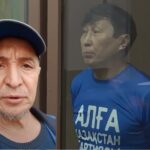Exactly a year ago, on September 2 and 3, 2009 a legal process took place in the Balkhsh district court, Almaty oblast, under the charge pressed against the leading Kazakhstan human rights activist, Director of the Kazakhstan International Bureau for Human Rights and Rule of Law Yevgeniy Zhovtis in violation of the traffic rules entailing the death of a person. At the conclusion of the second day the court read the ruling – 4 years of imprisonment in the colony-settlement; later on the given sentence was upheld by the Almaty oblast court and Supervisory Board of the Supreme Court of the RK.
Exactly a year ago, on September 3, 2009 in the afternoon the convicted human rights activist was incarcerated and after two month stay in the detention investigation facility in Taldykorgan city he was escorted to the colony-settlement OB 156/13 in Ust-Kamenogorsk city, in which he serves his term now. Mass protests of Kazakhstan and international public organizations in support of Yevgeniy Zhovtis, detailed reasoned reports of independent lawyers regarding outrageous breach of the law in case of Yevgeniy Zhovtis, different actions in support of the illegally sentenced human rights activist have not yielded results so far.
From Bakans court the practice of peculiar use of laws with regard to Y.Zhovtis passed over to the bodies of criminal-executive system of the Ministry of Justice of the RK.
Firstly, contrary to the law stipulating conviction term service in penitentiary institutions close to residence place of a convict, Yevgeniy Zhovtis has been ordered to a colony-settlement, which has been hastily set-up after the verdict has been read with regard to the human rights activist.
Secondly, being a professional lawyer he still makes attempts to stand his rights even being in the court, filing actions from the colony-settlement to the administration of the institution on recalling the punishments awarded.
We would like to remind that the first penalty imposed upon Y.Zhovtis was for the refusal from forced job as a safety engineer, for which this human rights activist does not have respective qualification.
However neither the complainant himself nor his defence party succeeded in trial on the merits in any of the four courts. Each court forwards the case to a different court under the absurd reason of the impossibility to identify the residence place of the complainant.
At the same time these penalties deprive Zhovtis of the formal right to a grant of parole and are used by the colony administration as a pretext to prohibit him visiting the city, residing and working outside of the colony. Though under the law this right is automatically granted to all the convicts in the colony-settlement, which is a major difference of this type of penitentiary institutions from other types of colonies and prisons. But to enhance isolation of the repressed human rights activist the powers have undertaken unprecedented transformation of the special regime of the colony-settlement personally for him into the conventional custody regime.
Unfortunately all the efforts of international organizations and governments of democratic states have not yielded whatever positive results.
More than that there are all the reasons to believe that refusal of the authorities from the long awaited amnesty timed to the 15th anniversary of the Constitution of the Republic of Kazakhstan could be based on (among other reasons) the strong unwillingness of set Yevgeniy Zhovtis free as well as other political prisoners – journalist Ramazan Yesergepov and Alpamys Bekturganov, political activists Yermek Narymbaiev and Aidos Sadykov that were sentenced the same year. Those Criminal Code Articles, under which they have been sentenced, and the terms of imprisonment from 2 to 4 years could have been subject to amnesty.
Exactly in a year after the legal process and conviction under the case of Yevgeniy Zhovtis, out of which 9 months of 2010 constitute a part of the Kazakhstan chairmanship in the OSCE, we are forced to state that nothing has changed in the life of the convict human rights activist and the country itself is more and more progressing to authoritarian regime and fighting dissidents.
Almaty, 3.09.2010 Kazakhstan International Bureau for Human Rights and Rule of Law




